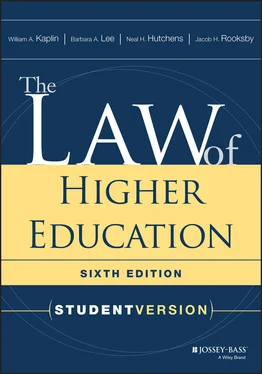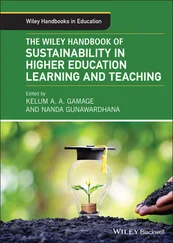Although an individual who testifies in court is protected from defamation liability by an absolute privilege, a court determined that statements made in an internal grievance hearing are not protected by such a privilege. In Overall v. University of Pennsylvania , 412 F.3d 492 (3d Cir. 2005), the plaintiff sued the University and a department chair for defamation and sex discrimination when she was not hired for a tenure track position. Although the trial court ruled that the allegedly defamatory statements made by the department chair during a grievance hearing involving the University's decision not to hire her were privileged, the appellate court disagreed. Because the University was private, the appellate court ruled that the grievance hearing was not a “quasi-judicial” proceeding and thus the privilege did not apply. The court remanded the plaintiff's defamation claim to the trial court.
Another conditional privilege that is important for administrators in state institutions is the privilege afforded to executive and administrative officers of government. In Shearer v. Lambert , 547 P.2d 98 (Or. 1976), an assistant professor at Oregon State University brought a libel action against the head of her department. While admitting that the statement was defamatory, the defendant argued that the privilege of government officers should be extended to lesser executive or administrative officers, such as the head of a department. The court agreed, reasoning that, since “the privilege is designed to free public officials from intimidation in the discharge of their duties, we are unable to explain why this policy would not apply equally to inferior as well as to high-ranking officers.” This qualified privilege is available, however, only where the defendant “publishes the defamatory matter in the performance of his official duties.”
If a defamation lawsuit is brought against an institution by a prominent administrator, trustee, or faculty member, a constitutional privilege may come into play. If the plaintiff is a “public figure,” he or she must prove that the defendant acted with “actual malice,” and the privilege to defame is thus broader than it would be if the plaintiff were a “private figure.” If a person is a public figure, another person may not be held liable for defaming him unless that other person's comment “was made with knowledge of its falsity or in reckless disregard of whether it was false or true” ( Garrison v. Louisiana , 379 U.S. 64, 74 (1964)). Thus, to the extent that members of the academic community can be characterized as public figures, the institution's potential liability for defamation is reduced. It is unlikely on any given campus at any particular time, however, that many administrators, staff, or faculty would be considered public figures.
But student-athletes or coaches may be considered public figures because of extensive press coverage or school-sponsored promotional activities. Furthermore, statements made concerning coaches or athletes are typically considered to be statements of opinion. For example, in two illustrative cases, coaches' defamation claims were unsuccessful because courts ruled that the statements made about the coaches were statements of opinion, rather than fact, and thus did not meet the legal standard for defamation. In the first, Moore v. University of Notre Dame , 968 F. Supp. 1330 (N.D. Ind. 1997), a former offensive line football coach was terminated, according to the university, because he had behaved abusively toward the players. In the second, Campanelli v. The Regents of the University of California , 51 Cal. Rptr. 2d 891 (Cal. Ct. App. 1996), university officials stated that the coach was fired because parents felt that he was placing their children under so much pressure that the children were becoming ill. In both cases, the courts ruled that neither statement was a factual assertion and, therefore, could not form the basis for a defamation claim. See also McGarry v. University of San Diego , 64 Cal. Rptr. 3d 467 (Cal. Ct. App. 2007), concerning a defamation claim brought by a coach against the university and the director of athletics; the court ruled that the alleged defamer had not acted with malice and that her statement, which could be interpreted as an assertion of immoral behavior, was an opinion and thus not actionable.
In many jurisdictions, truth is an affirmative defense to a defamation claim. In an unreported case, Morrison v. Chatham University , No. 16-476, 2016 WL 4701460 (W.D. Pa. 2016), a former student claimed she was dismissed from a doctoral program in counseling psychology because of allegedly defamatory statements that falsely accused her of plagiarizing a paper. Citing precedent that truth is an affirmative defense to defamation claims in Pennsylvania, a federal district court dismissed the plaintiff's defamation claim.
Charges of sexual misconduct against students have provided multiple opportunities for defamation litigation against colleges. One of the more famous cases is Doe v. Gonzaga University , 24 P.3d 390 (Wash. 2001), reversed on other grounds , Gonzaga University v. Doe , 536 U.S. 273 (2002). In Doe , a university administrator overheard a student office assistant tell another student that John Doe, an education student in his senior year, had raped a female student. At the time, John Doe was doing his student teaching. The administrator and a fellow staff member, both involved in placement for student teachers, met with the student whose conversation they had overheard, but the alleged victim had not reported any assault and refused to meet with the administrators to discuss the alleged incident. Despite the fact that the alleged victim would not provide information or corroborate the assault claim, the administrators decided not to recommend Doe for teacher certification because of these allegations. They gave Doe a letter to that effect; when Doe and his parents asked about his appeal rights, they were told there were none.
John Doe sued Gonzaga and several administrators for defamation, negligence, and breach of contract. At trial, Doe testified that his sexual relationship with the female student was consensual; in a videotaped deposition, the alleged student victim denied that Doe had assaulted her and denied that she had made any accusatory statements to university staff. A jury awarded Doe $500,000 for defamation and an additional $655,000 in compensatory and punitive damages for other claims, including a claim brought under FERPA that the Supreme Court dismissed.
Although the appellate court reversed the jury's defamation verdict, the Washington Supreme Court reinstated that verdict but affirmed the appellate court's dismissal of the negligence claim, stating that the university had no duty to the education licensing authority to investigate the allegations of sexual assault; when there was no duty, said the court, there was no claim for negligence. With respect to the defamation claim, the court ruled that the administrators were not protected by a qualified privilege because they were not acting “in the ordinary course of their work” when they involved themselves in the allegations of the student whose conversation the administrators secretly overheard.
Institutions that publish allegedly defamatory material in official publications or operate computer networks may be sued for transmitted libelous statements. See, for example, Rudloe v. Karl , 899 So.2d 1161 (Fla. Dist. Ct. App. 2005), in which the court ruled that sovereign immunity did not protect Florida State University from being sued by an alumnus for printing an allegedly libelous article in an alumni newsletter. Computer service providers will often be immune from such liability, however, under 47 U.S.C. § 230 (see Section 7.5.3 of this book).
Читать дальше












